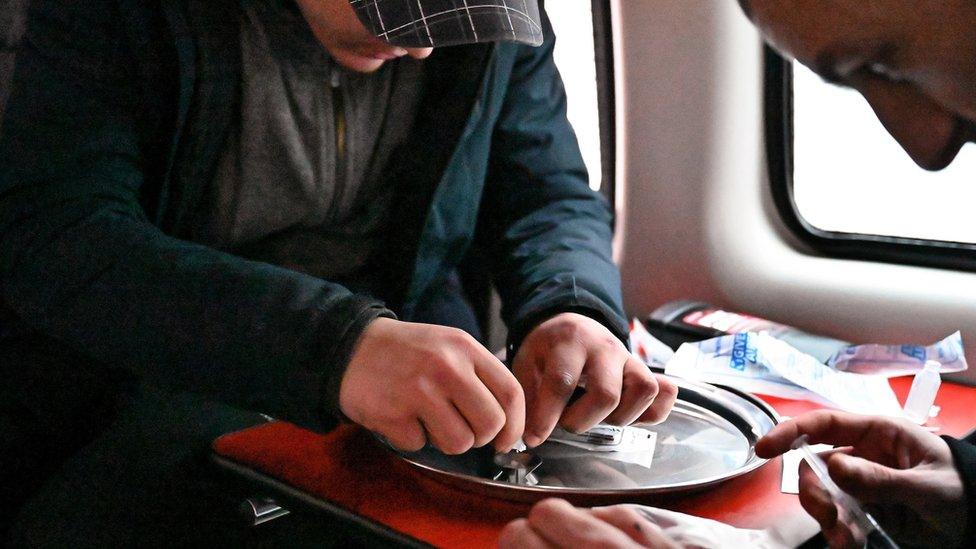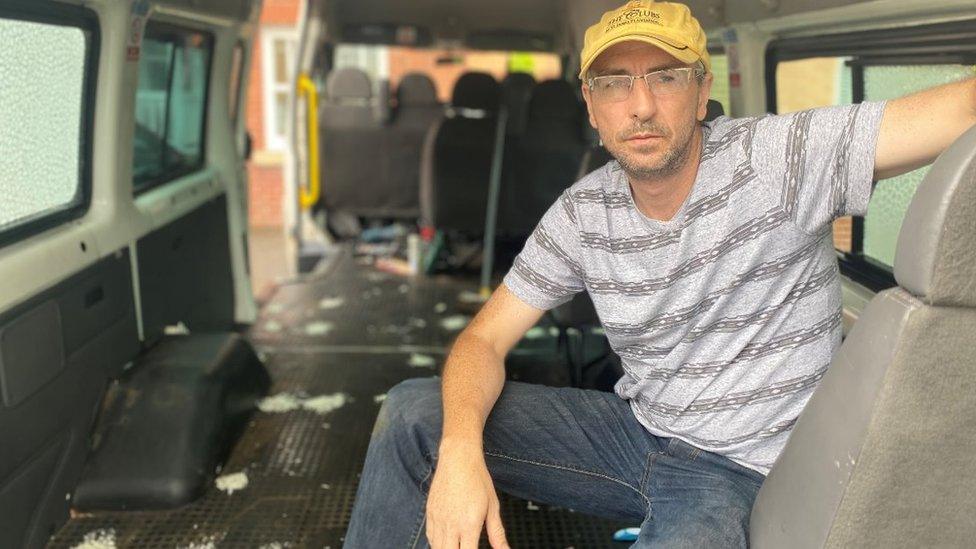Could drug consumption rooms become legal in Scotland?
- Published

A Westminster committee has backed calls for drug consumption rooms to be trialled in Scotland
Drug laws should be devolved to Scotland to allow for the trial of drug consumption rooms, according to a cross-party committee of MPs.
Westminster's Home Affairs committee said the 50-year-old Misuse of Drugs Act needs to be reviewed after overdose deaths hit record levels across the UK, with Scotland being the worst hit.
It also said the Scottish government should be allowed to pilot the facilities - also known as overdose prevention centres (OPC) - where drugs such as heroin can be injected under supervision.
The Scottish government - which controls justice and health - supports their introduction.
However, a previous attempt to set up consumption rooms in Glasgow was blocked by the UK government, which controls drug policy.
Why has the issue arisen again in Scotland?
The Home Affairs Committee - which is made up of MPs from different parties - made the recommendations as part of a wide-ranging review into UK drug policy.
Because the UK has seen record overdose deaths in recent years, it said policy tackling addiction must move away from a focus on criminal justice and punishment towards a "public health" approach, external.
As part of its report, it urged the UK government to either reform current laws or devolve drug policy to allow for OPCs to be trialled in Scotland.
Between 2014 and 2020, Scotland saw year-on-year record numbers of fatal overdoses and has among the worst drug death rates in Europe.
The record totals were fuelled by people mixing multiple drugs including heroin and so-called "street" Valium, tablets produced by drug gangs that flooded deprived communities.
The crisis prompted more than £250m of investment by the Scottish government into the country's disjointed addiction services in 2021.
Over the last two years, the number of deaths plateaued before seeing a 20% reduction in 2022.

Homelessness was said to be a key factor in Glasgow's HIV epidemic
Campaigners and some politicians have called for more radical action, including the introduction of OPCs - which have been operating in a number of countries in Europe and North America for years.
Recognised as only a small part of the puzzle in solving Scotland's drug crisis, the proposals nevertheless became symbolic of a public health approach campaigners said was needed.
Yet health officials in Glasgow had already tried to establish consumption rooms in Glasgow in 2016.
The city had faced the UK's worst outbreak of HIV in 30 years, as the virus spread among people injecting drugs in the city centre.
However, the proposals hit legal difficulties due to the need for police to ignore users carrying illegal drugs to the site.
The then-Lord Advocate James Wolffe KC - Scotland's top prosecutor - declined to back the plan in 2017, saying the issue was a public health matter rather than a justice one.
Subsequently, the UK government rejected the idea and continues to say it has no plans to revisit the issue.
So what has changed since the original proposals?
Crucially, Dorothy Bain KC became the new Lord Advocate in 2021.
In November of that year, she told Holyrood's Justice Committee that she would listen to "a very well set out proposal" for OPCs.
She said: "Then in terms of the undoubted crisis that we face in relation to the number of drugs deaths in Scotland, if it is in the public interest that there should be no prosecutions for those using drug consumption facilities with all these safeguards that require to be in place, then that would require a fresh consideration by me as Lord Advocate."
The Lord Advocate told MSPs the previous month that people caught with Class A drugs such as heroin could be given a warning instead of facing prosecution.
At the time, Scottish Conservatives said the move was "de facto decriminalisation".
Last year, Labour MSP Paul Sweeney also announced a consultation on a proposed Drug Death Prevention Bill, which would see the Scottish Parliament vote on introducing OPCs.
It came after activist Peter Krykant set up his own so-called "safe consumption van" in Glasgow without official funding or permission from authorities in September 2020.
Mr Krykant converted an old van into a "safe space" for users to take their own drugs.

Mr Krykant converted an old van into a "safe space" for users to take their own drugs
According to studies, consumption rooms can reduce overdose deaths, public injecting and drug-related litter, while a range of bodies and health experts - including the Royal College of Physicians of Edinburgh - said the proposals should be considered.
However, speaking to MSPs last year, former UK policing minister Kit Malthouse described the evidence as "limited".
Experts from Glasgow Caledonian University, Queen's University Belfast and the University of Kent studied the use of Mr Krykant's injecting van.
In the nine months in operated, nearly 900 injections were supervised, while they recorded "nine successful interventions in overdose events".
The study concluded, external: "It is feasible for an overdose prevention service to operate successfully in the UK without being shut down by the police or with negative consequences for the community."
The van has since ceased operation.
In July this year, the Scottish government said it wants to decriminalise all drugs for personal use to introduce OPCs and allow people to be "treated and supported rather than criminalised and excluded".
Tory MSPs described that position as "madness".
The NHS in Glasgow has already introduced a treatment service where a small number of people are prescribed diamorphine (heroin) while being supported by services.
The facility has 25 patients but there are plans to increase that number to around 40.
Is it likely is that consumption rooms will happen in Scotland?
While the findings of the committee strengthen their position, advocates of the approach must first deal with political reality - the scheme cannot go ahead under current laws or without Home Office approval.
OPCs have already been given support by the SNP, Scottish Labour, the Liberal Democrats and the Scottish Greens. The Scottish Conservatives have said they wouldn't block proposals for a pilot scheme.
Scotland's Drugs and Alcohol Policy Minister Elena Whitham welcomed the report from the Home Affairs Committee and said the Scottish government has "long called for agreement from the UK Government to allow us to do this, whether to support us in establishing a pilot or through devolving the necessary powers to allow us to do so".
She added: "It has always been in the UK government's power to accelerate the delivery of a safer drug consumption facility.
"If it was serious about looking to improve outcomes for people affected by problem substance use it could use powers reserved to it to support what we are already doing within devolved powers, or devolve the appropriate powers to us so we could move to implement a facility as quickly as possible."
However, the UK government remains opposed to the proposals and does not plan to introduce them.
A Home Office spokesman said: "There is no safe way to take illegal drugs, which devastate lives, ruin families and damage communities, and we have no plans to consider this.
"Our 10-year Drugs Strategy set out ambitious plans, backed with a record £3 billion funding over three years to tackle the supply of illicit drugs through relentless policing action and building a world-class system of treatment and recovery to turn people's lives around and prevent crime."